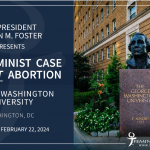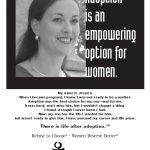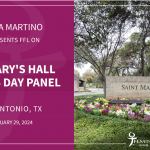Birthmothers and former Feminists for Life board members Jessica O’Connor-Petts and Julia Thornton were interviewed, along with FFL President Serrin M. Foster, by Cheryl Wetzstein in the Sunday, April 12, edition of theWashington Times.
We thought you would be interested to read the following excerpts:
[Y]oung women who choose adoption, like Julia Thornton and Jessica O’Connor-Petts, find themselves explaining their decisions to friends or family.
“Some of my friends worried about how difficult it would be for me” to place my child for adoption, Ms. O’Connor-Petts said.
“There’s a stigma attached to adoption,” Ms. Thornton said.
Meanwhile, millions of Americans remain willing, even anxious, to adopt, and this number is likely to grow…
Ms. Thornton was in college when she discovered she was pregnant. Alone and devastated, she sought help from a college counselor, but since continuing the pregnancy would completely upend her academic career and life plans, abortion was the counselor’s only serious recommendation.
“I left the appointment feeling frustrated,” recalled Ms. Thornton, who has told her story at events sponsored by Feminists for Life. “I wanted to explore all my options.”
As morning sickness and other pregnancy symptoms overwhelmed Ms. Thornton, she reluctantly realized she had to drop out of school – at a $10,000 cost to her family.
“I left my friends, my school and my academic career because I didn’t have the support necessary to continue my studies,” she said. “It was a tremendous price to pay for making the choice I made.”
Placing her daughter for adoption was “the most difficult decision I will ever make, but it was the right one,” she said.
Today, Ms. Thornton takes great comfort in knowing that the now-teenage girl – she sees her from time to time – is happy, healthy and living “a full life” with her adoptive family.
She thinks infant adoption has fallen into disfavor because of a lack of understanding about the unconditional love and sacrifice inherent in it.
“Speaking personally, there is nothing more humbling than to say, ‘I am not good enough for this child,’ and often, that’s what it comes down to,” Ms. Thornton told The Times. “To say, ‘There is a better situation in which your child can be raised’ – that takes a great sense of perspective and humility.”
….Feminists for Life… is urging Congress to [encourage] colleges to offer services for pregnant and parenting college students, such as those offered at Georgetown University.
Campus officials too often steer young women to abortion, saying, “Well, you can’t graduate if you have the baby,” said Serrin Foster, president of Feminists for Life. But what’s the use of being pro-choice if there aren’t any choices, she asked.
Another way to encourage adoption is to hold a dedication ceremony as part of the adoption, said Ms. O’Connor-Petts, who placed her child for adoption more than a decade ago.
When she gave her baby to his adoptive parents, for instance, it was in a Catholic church. A priest presided over the “entrustment ceremony” and blessed all the participants. Afterward, the baby went home with his new parents, and Ms. O’Connor-Petts went home with her parents.
Ms. O’Connor-Petts was a young, single college graduate when she learned she was pregnant. Marriage was not an option, but adoption was.
“We had always talked in my household growing up about abortion, and how adoption was such a natural choice for a woman not ready to parent,” she said. “So for me, it wasn’t such a long decision process. It was really the first thing that came to mind.”
She still toyed with the idea of single parenting.
“Financially, I could have done it,” she said. “But I was realistic with myself about what it would have meant for me – my goals, aspirations and what it would have meant for my child, who would have been in day care a lot.”
Also, there were many good prospective parents out there, “and it didn’t make sense to me to put my son in a situation where he probably wouldn’t have everything that I would want for him. He especially wouldn’t have the two-parent upbringing that I would want for him,” she said.
Ms. O’Connor-Petts initially pursued a “closed” adoption through Catholic Charities, which meant “I wasn’t going to know last names, but I would get updates and photos through the agency.”
But later, as the baby got older, “we all felt, and expressed to each other through the agency, that we would all be more comfortable with more contact.”
Today, she sees her birth son’s family a few times a year. He was also the ring bearer in her wedding and her sister’s wedding a few years ago.
The boy, who is now 11, has already asked her why she placed him for adoption.
“I was able to answer that, and I think he was happy with the answer,” she said. “I basically said that I wanted his parents to be his parents. I told him, ‘I thought that was best for you,’ since I was quite young and couldn’t give him the life I wanted him to have.”
Ms. O’Connor-Petts also has a response about the endless grief that is predicted by some birth mothers. “If you make the decision that you really believe is the best one for you and the child, you will be able to live with yourself,” she said. “The only way you won’t be able to live with yourself is when you make a decision that you sense is not the best decision for you or your child.”
“For some people,” she added, the best decision “may not be adoption. But for me, the joy of watching him grow up in his family far outweighs the grief of separating from him.”
As you may remember, both Jessica and Julia have shared their stories in The American Feminist.
You may read the full story on domestic adoption by Cheryl Wetzstein in the Washington Times.
Feminists for Life applauds Jessica and Julia for sharing the message that, as Jessica often says, “adoption is an empowering option for women.”
Feminists for Life does not endorse or promote one form of adoption over another, but instead advocates resources and support that address the unmet needs of birthmothers.








